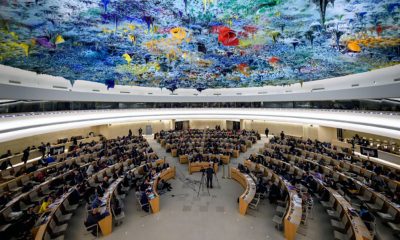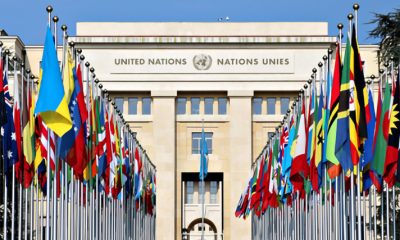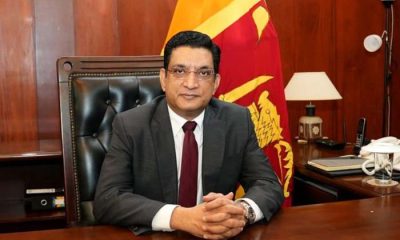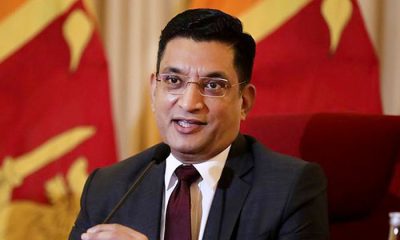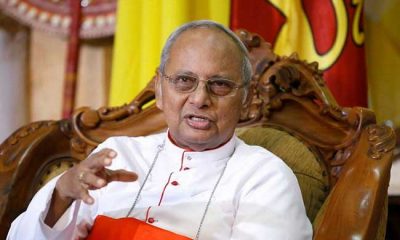News
SL rejects UNHRC resolution
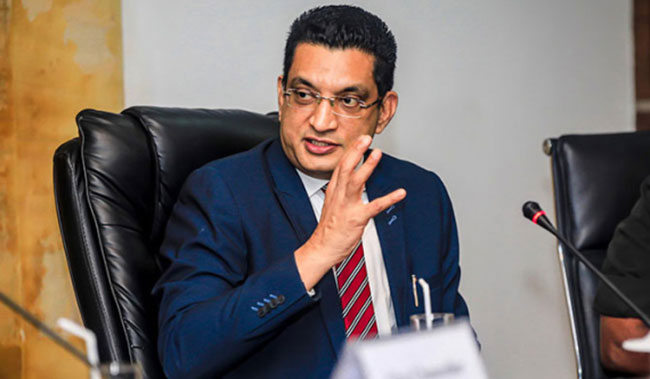
Sri Lanka has categorically rejected resolution A/HRC/51/L.1 (Rev.1), titled “Promoting reconciliation, accountability and human rights in Sri Lanka,” tabled by the United Kingdom, Canada, Germany, Malawi, Montenegro, North Macedonia, and the United States, which was adopted by a vote at the Human Rights Council (HRC) in Geneva, on 06th October.
Minister of Foreign Affairs Ali Sabry delivered the statement, on behalf of Sri Lanka as the country concerned, and called on the Members of the Council to reject the resolution by voting against it.
In support of Sri Lanka’s position, opposing the resolution, the delegation of Pakistan called for a vote. Over half of the members of the Council did not support the resolution with 07 countries (Bolivia, China, Cuba, Eritrea, Pakistan, Uzbekistan and Venezuela) voting against the resolution and 20 countries abstaining on the vote. 20 countries voted in favour of the resolution.Representatives of Pakistan, Brazil, China, Venezuela, Japan and Republic of Korea made statements in support of Sri Lanka prior to the vote.
Pakistan said that they share the concerns of Sri Lanka and other Member States that the resolution is intrusive and this level of scrutiny would not be even acceptable to any sovereign state, including the Core Group. They further observed that the resolution fails to recognize the horrendous acts of terrorism committed by the LTTE and its sponsors, lacks balance, proportionality and consistency. At a critical time, when the people of Sri Lanka expect demonstrations of global solidarity and support to face its economic challenges, which are not entirely of Sri Lanka’s own making, the Core Group chose a path that has the potential to exacerbate the problem, instead of improving the situation.
Brazil noted the need to avoid politicization of the work of the Council and reiterated their position that cooperation of the country concerned is key to the success of this Council’s initiatives. Brazil highlighted the responsibility of the international community to support the country in its recovery, including through international cooperation and assistance.
China appreciated the Government of Sri Lanka’s commitment to promoting and protecting human rights, advancing sustainable socio-economic development, improving living standards, protecting the rights of the vulnerable groups, facilitating national reconciliation and combatting terrorism. China regretted that the resolution is tabled without the consent of the country concerned, is a product of politicization, and will by no means play any positive role in the promotion of human rights in Sri Lanka. China highlighted that the work of the Council should be guided by its founding principles and that all parties should promote genuine dialogue and cooperation and refrain from adopting double standards. China rejected the practice of using human rights as a pretext to interfere in the internal affairs and undermine the sovereignty of other countries to the detriment of international cooperation.
Venezuela expressed their deep concern at initiatives that do not have the support of the country concerned and that the Core Group is insisting on imposing hostile initiative, monitoring and oversight mechanism without the consent of Sri Lanka, ignoring the progress made by the Government. Venezuela highlighted that the mechanism financially bleed out over 6 million dollars that could have been better used to support the least developed countries and further that the practice of wasting money seems all too common in the Council.
Japan recognized the progress made by Sri Lanka and said that the Government’s own initiatives, efforts and commitments are indispensable to achieving real change on the ground.Republic of Korea noted with appreciation the efforts of the Government of Sri Lanka to promote national reconciliation, reconstruction and prosperity.Sri Lanka is grateful to the countries which withstood pressure by the sponsors and demonstrated their support to Sri Lanka by voting against or abstaining on the vote as well as by speaking in support of Sri Lanka.
While delivering the Sri Lanka statement as the country concerned, the Foreign Minister regretted that a draft resolution on Sri Lanka is tabled once again despite the progress made domestically on reconciliation and human rights and Sri Lanka’s continued constructive engagement with the Council. He outlined Sri Lanka’s intention to move forward domestically with replacing the Prevention of Terrorism Act (PTA) with a comprehensive national security legislation, and the introduction of Constitutional amendments and a legal framework to strengthen democratic governance, participation and the rule of law as well as independent institutional oversight. On reconciliation and human rights, Sri Lanka is awaiting the final report of the Presidential Commission and the establishment of a domestic truth-seeking mechanism is under advanced discussion. He also referred to Sri Lanka’s upcoming engagement with the UPR process.
Minister Sabry highlighted that while the resolution may meet the objective of advancing the political considerations of the sponsors, it is manifestly unhelpful to Sri Lanka.The Minister strongly opposed the resolution, particularly the proposal in Operative Paragraph (OP) 8 that seeks to ‘extend and reinforce’ the so-called “external evidence gathering mechanism” created by the Office of the High Commissioner for Human Rights (OHCHR). The mechanism is outside the mandate envisaged for the Council. No sovereign state can accept the superimposition of an external mechanism that runs contrary to its Constitution and which pre-judges the commitment of its domestic legal processes.
The Minister also noted that many countries have already raised serious concerns on the budgetary implications of this resolution given its ever-expanding mandate. He further noted that this is an unhelpful and misdirected drain on the resources of all Member States, including the donors in the midst of ongoing global crises. In sharp contrast, he said that we are faced with the dire financial needs of developing countries to prevent hunger and child malnutrition.
Foreign Minister Sabry objected to the references in the resolution to matters which are outside the framework of the Council such as domestic economic and financial policy. He further observed that solutions to economic and financial crises faced today by many countries will not be found in the mandate, the instruments or the expertise of the Council.
The result of the vote demonstrates that the resolution is another example of the North-South polarization and politicization of the Council, contrary to its founding principles. This vote also demonstrated solidarity among the countries of the South which continued to support the basic founding principles of the Human Rights Council of universality, impartiality, objectivity and non-selectivity leading to constructive international dialogue and cooperation.The Human Rights Council comprises 47 members, including 13 African states, 13 Asia-Pacific states, eight Latin American and Caribbean States, seven Western Europe and Other States, and six Eastern European States.
Latest News
Death toll rises to 607, missing persons reduce to 214 at 1800hrs today (5)

The situation report issued by the Disaster Management Centre at 1800hrs today (5th December) confirms that 607 persons have died due to the adverse weather conditions while the number of missing persons has reduced to 214.
The number of persons affected topped the 2 million mark (2,082,195).
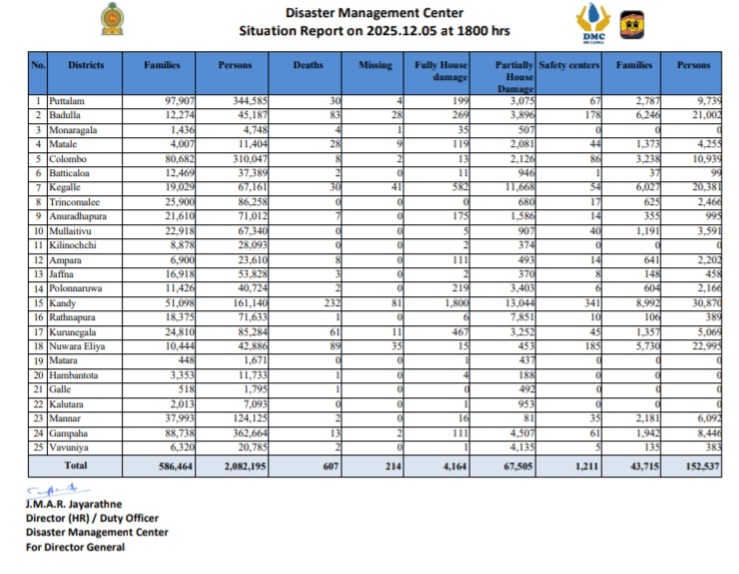
Latest News
Sri Lanka Navy takes delivery of Ex-USCGC DECISIVE

The Sri Lanka Navy (SLN) formally took delivery of the EX- United States Coast Guard Cutter, USCGC DECISIVE, provided by the United States to SLN, at a ceremony held at the United
States Coast Guard Yard in Baltimore on 02 Dec 25. The event was also attended by the Commander of the Navy, Vice Admiral Kanchana Banagoda.
The ship formally joined the SLN fleet on 02 December under the pennant number P 628 and the main mast of the ship will fly the National Flag effective from that date.
Aiming to strengthen and develop partnerships to overcome common challenges in the maritime domain, the U.S. Coast Guard has previously provided 03 ships to SLN and they are currently patrolling island waters under the names of ‘Samudura’ (P 621), ‘Gajabahu’(P 626), and ‘Vijayabahu’ (P 627).
As an extension of partnership ties that bring value to each other’s services, Ex-USCGC DECISIVE was transferred as the fourth ship to be handed to SLN.
Ex-USCGC DECISIVE, a ‘B-Type Reliance Class 210-foot Cutter’, measures 64m in length, and having endurance of 6000 NM at cruising speed. Further, she has been designed for a
crew of 100 and is equipped with weapons and machinery.
The ship which was used by the U.S. Coast Guard has rendered exceptional service during her tenure by curbing illegal activities, including smuggling of narcotics in U.S. waters.
Sri Lanka inherits an Exclusive Economic Zone (EEZ) that is seven times larger than the landmass. In such a backdrop, the Navy is determined to deploy this vessel in wide-ranging
operations that include the conservation of marine resources in the region and the search and rescue of naval and fishing communities in distress. Thereby, the Navy will be able to utilize
this vessel efficiently in the future to achieve the national aspiration, while ensuring safe and secure seas for all economic affairs.
The formal handing over – taking over ceremony was also distinguished by the presence of the Deputy Chief Acquisition Officer and Director of Domain & Integration Services U.S. Coast
Guard, James L. Knight, Deputy Assistant Secretary of War for South and Southeast Asia, Dr. Andrew Byers, the Ambassador of Sri Lanka to the United States, Mahinda Samarasinghe, Commanding Officer designate of P 628, Captain Gayan Wickramasuriya as well as a group of officials from the Embassy of Sri Lanka in United States and the State Department
of the United State
Latest News
486 dead, 341 missing, 171,778 displaced as at 0600hrs today [05]

The situation report issued by the Disaster Management Center at 0600hrs today [5th December] confirms that 486 persons have died and another 341 persons are missing after the devastating weather conditions in the past week.
171,778 persons have been displaced and have taken refuge at 1,231 safety centers established by the government.

-
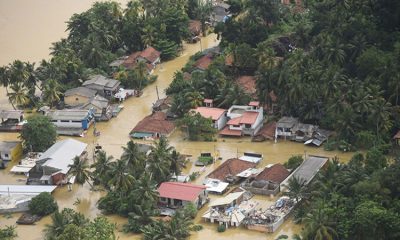
 News6 days ago
News6 days agoWeather disasters: Sri Lanka flooded by policy blunders, weak enforcement and environmental crime – Climate Expert
-
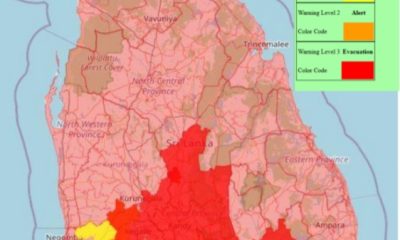
 Latest News6 days ago
Latest News6 days agoLevel I landslide RED warnings issued to the districts of Badulla, Colombo, Gampaha, Kalutara, Kandy, Kegalle, Kurnegala, Natale, Monaragala, Nuwara Eliya and Ratnapura
-

 Latest News6 days ago
Latest News6 days agoINS VIKRANT deploys helicopters for disaster relief operations
-
News3 days ago
Lunuwila tragedy not caused by those videoing Bell 212: SLAF
-

 Latest News7 days ago
Latest News7 days agoDepartment of Irrigation issues Critical flood warning to the Kelani river basin
-

 Latest News4 days ago
Latest News4 days agoLevel III landslide early warnings issued to the districts of Badulla, Kandy, Kegalle, Kurunegala, Matale and Nuwara-Eliya
-

 News2 days ago
News2 days agoLevel III landslide early warning continue to be in force in the districts of Kandy, Kegalle, Kurunegala and Matale
-

 Editorial7 days ago
Editorial7 days agoNeeded: Action not rhetoric


